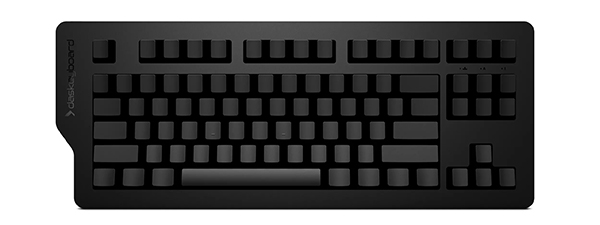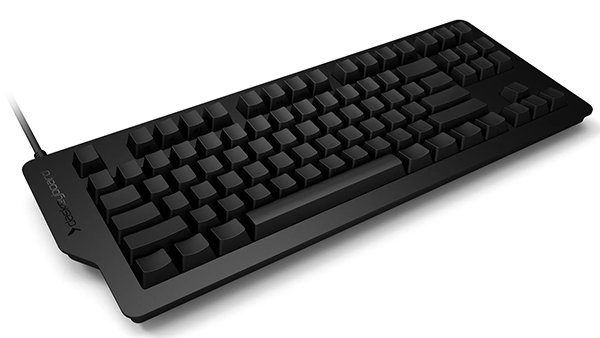Tom's Guide Verdict
The Das Keyboard 4C Ultimate is stylish and minimalist, but doesn't offer enough unique features for its asking price.
Pros
- +
Respectable keys
- +
Sleek design
- +
Driverless installation
Cons
- -
Very expensive for what it does
- -
Few unique features
- -
Promises more than it can deliver
Why you can trust Tom's Guide
Quick: Close your eyes and type, "The quick brown fox jumps over the lazy dog" into your URL bar. How did you do? If your innate familiarity with touch typing means that you don’t need letters on your keyboard, the Das Keyboard 4C Ultimate ($143) has you in mind, combining letterless keys with a simple, but premium design.
Everything about the Das Keyboard 4C Ultimate, from the marketing to the aluminum chassis, screams "elite." As it turns out, though, the keyboard delivers just moderate quality and no special features to go along with its slick appearance and high price.
(Note: if a letterless keyboard is not to your tastes, you can also invest in the Das Keyboard 4C Professional. Save for the presence of written letters and numbers, this model is identical to the 4C Ultimate.)
Design
If you visit Das Keyboard's website, the words "euphoric typing experience," "badass typists" and "envious glares" show up before the second paragraph is out. The company's marketing hype is not exactly subtle: You don't want the 4C Ultimate because it's better than the competition; you want it because you're better than the competition.
MORE: Best Gaming Keyboards

Still, Das Keyboard promises that the 4C Ultimate looks awesome, and lives up to its promise. The keyboard's face is anodized aluminum (the keycaps are still plastic), and its shiny jet-black face can look either elegant or cool, depending on whether you need it in an office or a gaming rig setup.
Where the 4C Ultimate distinguishes itself from most keyboards is that there are no letters on any of the keys. No letters, no numbers, no Enter, no Shift, no Print Screen — nothing. While this won't intimidate touch typists, hunt-and-peckers are better off with the $143 Das Keyboard 4C Professional, which has letters.
The 4C Ultimate is also tenkeyless, so take into account how much you really want a numpad before picking one up.
Keys and Typing Speed
A mechanical keyboard is only as good as its switches, and in this respect, the 4C Ultimate works fairly well, with two solid choices for mechanical key aficionados. The 4C Ultimate lets consumers choose between resistant-but-quiet Browns and their clackety Blue counterparts.

While typing on the 4C Ultimate is extremely comfortable, it’s not necessarily fast. Using the Ten Thumbs Typing Test, I logged 102 words per minute with a 1 percent error rate on the 4C Ultimate. A standard Dell office keyboard gave me 111 words per minute with an error rate of zero. After working with the keyboard for a few days, I tried the typing test again with similar results.
One potential reason for the slower typing is that the 4C Ultimate’s Greetech Brown switches require a fair amount of force to actuate: 55 g with 3 mm of travel. Compare this to a Cherry MX Brown switch, which requires 45 g and has 2 mm of travel. When we tested the Logitech G710+ with Cherry MX Brown switches, I found that I typed just as fast as on my office keyboard.
I usually like a bit of resistance on my mechanical switches, but the Greetech Browns felt a bit stiff overall. They’re comfortable and functional overall, but not the best the industry has to offer.
Features
The 4C Ultimate is admirably lightweight in terms of installation. It has no special drivers and no dedicated software. Simply plug it in, and it works. While this isn't ideal for high-level gaming, it saves hardcore typists and more casual gamers a few potential headaches.

Not having software does have a few drawbacks, though, especially for gamers. You can't program macros, and would have no extra keys for them, even if you could. The peripheral lacks backlighting — fair enough, since there are no letters or numbers to see, and most touch typists do not need to see the keyboard, anyway.
Still, backlighting is not strictly for highlighting letters. It can also illuminate a keyboard’s general shape in a dark room, and it can look attractive, given the right setup. Not having it doesn’t hurt the overall typing experience, but it would have added a welcome bit of flavor.
The 4C Ultimate also has media controls mapped to the top row of Function keys, but good luck seeing them. The designations are absolutely tiny, and require an awkward combination of the lower-left Function button with the upper row to function. It's uncomfortable and hard to see, although it does work just fine once you get used to it. A key for disabling the Windows button during gameplay sessions works the same way.
Performance
While the 4C Ultimate is primarily for typing, the website claims that it's a perfect companion for gaming as well. To put this to the test, I ran it through the standard Tom's Guide battery of Titanfall, StarCraft II: Heart of the Swarm, Assassin's Creed Unity and Star Wars: The Old Republic.
MORE: Best Gaming Mice
The results were good across the board. Like any keyboard with high-quality keys, the 4C Ultimate felt comfortable and responsive in every genre. As it lacks macro functionality, however, it's not an ideal choice for high-level tournament or massively multiplayer online play.
Bottom Line
The 4C Ultimate is a perfectly good keyboard, but it's expensive and -- other than the lack of letters -- unremarkable. A tenkeyless keyboard that costs more than $100 is not unheard of, but something like the Corsair K65 RGB gives you both full rainbow backlighting and a robust software suite. Even the $80 CM Storm Quickfire Rapid offers a software suite and a few extra features, and both it and the Corsair use superior Cherry MX keys. The 4C Ultimate — and by extension, its 4C Professional counterpart — is stylish and minimalist, but, ultimately, it doesn't offer enough unique features for its asking price.
- Gaming Keyboard Face-Off: Gaming K70 vs. Orion Spark vs. BlackWidow Chroma
- Most Anticipated Games This Year
- Best Games of the Year
Marshall Honorof is a Staff Writer for Tom's Guide. Contact him at mhonorof@tomsguide.com. Follow him @marshallhonorof. Follow us @tomsguide, on Facebook and on Google+.
Marshall Honorof is a senior editor for Tom's Guide, overseeing the site's coverage of gaming hardware and software. He comes from a science writing background, having studied paleomammalogy, biological anthropology, and the history of science and technology. After hours, you can find him practicing taekwondo or doing deep dives on classic sci-fi.
-
turkey3_scratch It'd be cooler if the keys would glow up with the click of a button in a cool yellow neon.Reply

